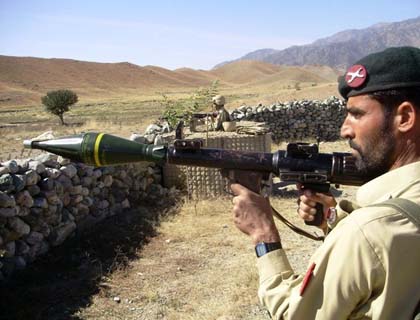Afghan government decisions—concealing the upcoming Pakistan's Prime Minister, Yosuf Reza Gilani's visit, and postponing the second round of Joint Peace Council Conference that was about to be held in Kabul city, the capital——set me on the dais of extreme astonishment. However, within past ten years, the bilateral relation has not always gone on smooth Concrete Avenue, and officials of both countries often have took harsh stance against one another, But, generally, the relation was somehow good and it never went to the edge of collapse.
Seemingly, the situation is not that cool as it has been, and what has changed fundamentally is the policy of Afghan government, perhaps, not that of Pakistan's. Kabul government consistently tried to enhance the bilateral relation and ignored malpractices frequently committed by neighbor. And it turned deaf ears and watched with closed eyes to ground realities that experts continually detailed and alarmed it of.
Time and again the relation strayed out of its normal path on political, economic and commercial spheres. Afghan traders and entrepreneurs complain about challenges they are facing while transferring goods through Pakistan. Their trucks were barred to cross the border and transfer loadings to Afghanistan.
They also warned Pakistan of cutting all economic and commercial ties with the country if Islamabad official continued creating problems and challenges for Afghan traders. In return, what Kabul officials, particularly, President Karzia did was requesting Pakistan to resolve problems through talks and discussions.
In another word, President Karzia always has been a grand block ahead to prevent any flow of anger and irritation between the two countries. And his diplomatic efforts have ultimately turned the strayed truck back on peaceful track. Even in the case of artillery shelling months ago, Afghan officials got mad and the parliament summoned concerned administration officials to respond to their questions.
The attacks proved economic and politically consequential as residence of provinces near border suffered losses. Several people got injuries and some others were killed. In addition, hundreds of people were forcedly displaced and they migrated seeking safer places in other provinces of the country.
The same scenario was repeated; there were reports of artillery firings into Nouristan and Paktiya provinces that also forced many to leave their houses and migrate to safer places.
Reports of barrage hit the headlines of domestic Medias with bold lines, talking about military assault of Pakistan. And Afghan civilians also held several anti-Pakistan demonstrations and asking government to cut all ties immediately and answer likewise. Even people were arguing that Karzia's and Afghan foreign allies silence on the issue was shameful.
But, Instead of turning against Pakistan, President Hamid Karzia humbly asked his counterpart and other decision maker to stop firings which only provided opportunity for militants to grow stronger. Pakistani officials too have never accepted the responsibility of firings and promised president to probe the issue, which of course have never held, or if held, the result never publicized. Seemingly, President Karzia also, perhaps, has not asked for the result that who were behind those firings, if Pakistani troops weren't. And why culprits were not brought into justice?
He certainly wanted the issue to be forgotten and the case never be opened at any domestic and international courts of law in order to curb the growing tension.
Thus, there is a question, "Why Mr. President remained too silent against actions that angered many of his very close supporters. Why he remained committed to illusionary friendship with Pakistan though he knew/knows that his sincerity is deemed as a sign of weakness not patience and enthusiasm for continuance of friendship.
As he once vividly said that "Pakistan is a brother" country, while "India is a friend". The very tone and context of that speech in Pakistan dealt strong impression on Indian officials and Indian newspapers released it with bold lines. The impression was: if Pakistan was a brother, and India was a friend, then friend would be sacrificed in the case of possible controversy between the two. Then what happens to continuing technical, educational, logistic, and financial support that India pours inside the country?
Such speeches as well as his consistent emphasize on friendly relation with Islamabad showed how he was desperately struggling to enhance the bilateral relation by ignoring blunt activities that went against his inner desire. And to what extent he was ready to sacrifice and accept humiliation for the sake of a broader national interest—keeping relationship.
It is controversial issue within AfPak that Pakistan have not met all commitments made against insurgency with USA and Kabul government. Though it cut ties with militants groups, but there are groups that are still active within the country facing not critical challenge, perhaps, Inter-Service Intelligence (ISI) spay agency maintain ties with insurgency like Haqqani group.
As for everyone, it is clear for President Karzia, but still he wanted to keep friendship with Pakistan.
So, what has happened to Afghan government to make a huge turn and conceal the visit of Prime Minister Yosuf Reza Gilani, while recently Islamabad officials showed willingness to enhance the bilateral relationship?
The answer lies here; after making such large efforts and continuing silence, now Kabul official have come to an understanding that the "request and mere appeal" from Pakistan would not work as they desire. Thus, lets try a new a policy; the policy that US have recently held too tight.
Two factors were effective in changing the policy: one, the assassination of High Peace Council Chief, Mr. Burhanuddin Rabbani and second, the continual failure of previous policy to entice Pakistan to pressurize militant groups active within the country. Though Pakistan promised to push for success of peace process, but now Afghan official claim there weren't effective practical step necessary to bring about Taliban to hold negotiation with Afghan government. So, with the change of this policy, Kabul government wants to send a signal that unless there is fundamental change in Islamabad policy, it would not continue its illusionary friendship.

